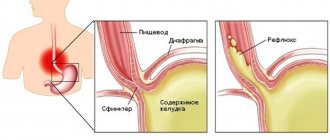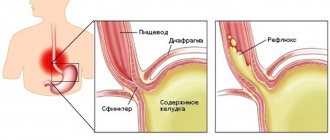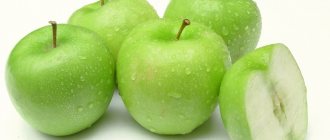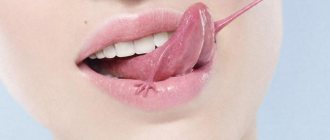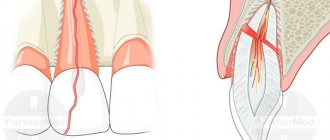At the same time, they do not in any way depend on the taste of the food consumed, but appear on their own.
Most of these patients note that they feel an unpleasant taste of soda in their mouth.
In this case, it may disappear for a short time, and then appear again.
Important! Such a symptom must be treated with the utmost care, because it often hides serious health problems.
Probable Causes
Diseases
A common cause is disruption of the digestive system. But serious diseases can provoke the phenomenon.
- Liver problems. In the initial stages of liver disease, there is no pain syndrome, so the taste of soda will help not to miss a possible malfunction of the body.
- Disorders of the biliary tract. Perhaps they are full of bile. During normal operation, bile should flow into the duodenum. But in case of pathology, it accumulates in the gallbladder, after which it is thrown out through the stomach and esophagus into the mouth.
- Gastritis with low acidity. When the secretion of gastric juice is weak, food is not completely digested, it stagnates, which provokes a kind of fermentation in the body. The result is an unpleasant odor (halitosis) and a soda taste in the mouth. A related symptom of the disease is a rotten taste.
- Diabetes. Only an endocrinologist can establish an accurate diagnosis. Only he can eliminate the symptoms by prescribing medications and a therapeutic diet.
- Violation of the integrity of the tooth, inflammation of the gums, and bleeding are possible provocateurs for the appearance of a soda taste in the oral cavity.
To solve the problem you need the help of a specialist. Only a full medical examination will allow you to accurately determine the source of the unpleasant taste. And the doctor will be able to establish a diagnosis and prescribe a course of treatment. Ignoring such a symptom is unacceptable!
Other provocateurs
- Alcohol abuse. Excessive drinking leads to dehydration. As a result, saliva becomes more viscous, sometimes salty, and begins to taste like soda. It is necessary to limit or completely stop drinking alcoholic beverages.
- Long-term drug therapy. Some medications and treatments cause changes in taste because they affect nerve endings, changing the brain's perception. It is possible to refuse to use a particular drug, but only with the approval of the attending physician.
- Binge eating. The intestines do not have time to process large volumes of food and lose activity. Food stagnates, which leads to an unpleasant astringent sensation in the mouth. Will correct the situation: balanced fractional meals.
- Excess iodine. It is rare in medical practice. Associated symptoms: foul breath, fever and vomiting. Gastric lavage will help.
- Nutrient deficiency. American doctors associate the loss or severe decrease in taste with a lack of vitamin B12 and zinc in the body.
- Smoking. Cigarettes contain toxic chemicals that damage your taste buds. The result is a terrible taste and bitterness in the mouth. In experienced smokers, even after quitting the bad habit, the receptors may not fully recover.
Provocateurs: antibiotics, antidepressants, hormonal, cardiac, chemotherapy, neurological medications, drugs for tuberculosis, Alzheimer's disease.
Attention! The taste of soda in your mouth may indicate other serious disorders: brain damage, an allergic reaction, the effects of radiation therapy, an autoimmune disorder.
Application on the farm
The substance is also irreplaceable in everyday life. It is an excellent cleaning agent. To restore their shine, chrome items and silverware are rubbed with dry soda, washed with soapy water, and then wiped dry with a soft cloth.
Sodium bicarbonate powder applied to a damp sponge will remove scratches and abrasions on vinyl flooring. Tile, kitchen stove, sink and plumbing fixtures can be cleaned of dirt by treating them with a thick mixture of baking soda and water. The same mixture helps get rid of the specific cat odor in places where there were “marks”.
To remove odors
The good hygroscopicity of sodium bicarbonate is the reason why it quickly absorbs odors, so it can be used to eliminate various odors. To get rid of unpleasant odors in the refrigerator, you need to pour dry powder into a glass and place it in the refrigerator door. By changing the contents of the glass as needed (once every 1-2 months), you can permanently get rid of the specific “refrigeration” smell.
If the smell of sour milk persists, the “smelling” containers should be cleaned with dry powder. Do the same with dishes that smell of fish.
If you pour a few tablespoons of powder into the drain hole, and after a few minutes turn on warm water, you can eliminate the unpleasant odor from the siphon under the sink.
Baking soda will also help deal with the unpleasant odor from the carpet. To do this, sprinkle the carpet with powder, leave it for 20-30 minutes, and then vacuum it thoroughly. However, this method is only suitable for non-fading carpets.
Using baking soda, you can also prevent the appearance of unpleasant odors, for example, from a washing machine or dishwasher when they are idle for a long time. When leaving home for a long time, you should rub the inside surface of the machines with dry bicarbonate and leave their doors ajar, and after returning, run them in the rinsing mode.
For clothing care
When machine washing, it is good to add baking soda to the washing powder. This will help get rid of the unpleasant odor in the washing machine, improve the quality of washing and the aroma of washed clothes. Clothes that smell bad can be washed in a machine by sprinkling them generously with baking soda.
A wet swimsuit will not become moldy and will not smell unpleasant if, after swimming in a pool or natural body of water, you put it in a bag with soda, and rinse it thoroughly and dry it at home.
Associated symptoms
Nausea
The taste of soda along with nausea indicates gastritis.
Bitterness
If bitterness and metal are mixed into the soda taste, this is a sign:
- pathologies of the liver and biliary tract;
- lazy bowel: weak peristalsis leads to the accumulation of food debris in the intestinal tract.
Sweet taste
The taste of sweetness in the mouth is one of the first symptoms of diabetes.
Dry mouth
The feeling of dryness in the mouth (when the mucous membrane seems tight, thirst arises) is subjective, but it clearly signals that you need to make an appointment with a doctor.
Viscous saliva
Indicates alcohol abuse and/or dehydration.
Liver pain
A soda taste in combination with pain in the liver can indicate serious diseases of the hepatobiliary system.
Since at the beginning of the disease the liver does not cause pain, people who are inattentive to their body trigger the disease.
Rules for the procedure
In order for rinsing to be beneficial, you need to adhere to certain rules3 in the use of ready-made preparations and the preparation and use of solutions from them.
- The proportions of the components must be strictly observed. The question “how much baking soda to gargle” is perhaps one of the most popular on the Internet. It disappears if you use ready-made pharmaceutical preparations that no longer need to be diluted with water - these are the ones most often recommended by doctors.
- The solution should not be cold or hot - only warm3,4. For this reason, there is no need to keep medications in the refrigerator.
- Follow the instructions for the duration of the procedure - this ensures the necessary contact of the active components of the drug with the mucous membrane3.
- Follow the manufacturer's recommended frequency of treatments to ensure continuity of treatment. The components of the drug retain their activity at the site of inflammation for a limited amount of time.
- Try not to swallow the product. Of course, there will be no poisoning in any case, but still, rinsing preparations are not intended for oral administration.
- For half an hour after the procedure, drink nothing and do not eat food3,4. This is important to prolong the contact of the drug with the affected mucous membrane.
Up to contents
Development time
After meal
A common reason for feeling the taste of soda immediately after eating is overeating.
The body, which has received a large portion of food (be it fried potatoes or vegetable salad), is not able to immediately break down and absorb it. Undigested residues settle in the gastrointestinal tract (GIT), forming real blockages.
Before bedtime
Due to the gradual accumulation of digestive waste in the body, an unpleasant taste may not appear immediately after eating, but only before bed.
In the morning
The taste of soda in the morning signals problems in the digestive system: the food that entered the body the day before during dinner did not have time to be digested.
The second probable cause is problems with teeth and gums, inflammatory processes in the ENT organs.
During pregnancy
As a result of a hormonal surge, pregnant women become very sensitive to bright smells and tastes. In the first months, some complain of the feeling of the presence of soda in the mouth. This goes away in the second trimester.
But another reason is possible.
Expectant mothers, listening to the advice of the older generation, begin to eat for two. Add exotic food wishes to this and you get an overload of the digestive system.
This negatively affects the unborn child. A woman’s health also suffers: an unbalanced diet during pregnancy serves as an impetus for the development of gastrointestinal diseases and obesity.
Useful video
From this video you will learn what to do if you have an unpleasant taste in your mouth:
The feeling of soda in the mouth is a signal from the body that requires careful attention to itself .
It is quite possible that he is simply “tired” of overeating, nervous tension , taking a large number of medications and begins to malfunction in this way.
And it is quite possible that he is crying out for help. And it requires curing a disease in order to avoid the occurrence of other, more serious health problems.
After food
Milk
Feelings of the presence of soda in the mouth, dryness and tightness of the mucous membrane after milk can indicate problems with the stomach, especially if accompanied by nausea.
Baked goods containing soda
Many baked goods contain baking soda as a leavening agent. The characteristic taste after eating such sweets is not a cause for concern.
The body probably received an excessive amount of sodium bicarbonate from food. After some time, the unpleasant feeling will pass.
Jam
Sometimes a pinch of soda is added to the jam, but its taste after the classic delicacy is a signal that you need to see an endocrinologist.
The appearance of a persistent soda taste after sweets is associated with a sharp jump in blood sugar levels. Most likely, diabetes mellitus develops.
Chemical properties
Sodium bicarbonate is a weak acid salt of carbonic acid. They are small colorless crystals, which, when the temperature rises to 50-60°C, begin to “give up” a molecule of carbon dioxide, gradually decomposing to sodium carbonate (soda ash).
Reacts with acids to form salts (chloride, acetate, sodium sulfate) and carbonic acid, which instantly breaks down to water and carbon dioxide. The powder is poorly soluble in water and is easily separated by filtration.
Prevention
The best prevention: regular visits to a therapist, passing the necessary tests. If you have the slightest problem with the digestive system, consult a gastroenterologist.
Effective preventive measures:
- Regular cleansing of the oral cavity: brushing teeth twice a day (morning and evening), additional rinsing with special antibacterial agents.
- Cleaning the tongue in the morning with a teaspoon (light movements back and forth, left and right) followed by rinsing with water.
- Eating citrus fruits. Lemons, oranges and grapefruits promote natural salivation and sanitize the oral cavity.
- At least 2 liters of clean drinking water daily.
- Rinse with a solution of sea salt, water with lemon juice, decoctions of chamomile, sage, fennel.
- Regular fractional and rational meals, rich in nutrients.
- The use of additional intestinal support agents during long-term drug treatment.
Use in cosmetology
Baking soda is an excellent cosmetic product. A scrub made from crushed oatmeal and dry sodium bicarbonate has a good cleansing and whitening effect. After such a scrub, the skin becomes soft, and its regular use gets rid of acne. To add shine to your hair after washing your hair, you need to treat it with a solution of soda and lemon juice.
For weight loss
Sodium bicarbonate is also used for weight loss. To lose up to 2 kg in one procedure, you can fill a bath with warm water and dissolve 0.5 kg of sea salt and 0.3 kg of regular baking soda in it. Anyone losing weight needs to immerse themselves in such a bath for 20 minutes. In this case, the water temperature should be about 40°C. A soda-salt solution relaxes muscles, relieves fatigue and nervous tension, cleanses lymphatic vessels, and reduces tissue swelling. After a bath, you don’t need to dry yourself: just put on a warm robe. It is better to do such water procedures before bed.
Treatment methods
- To prescribe the correct treatment, the doctor will definitely refer the patient who complains of the taste of soda in the mouth for examination: ultrasound of internal organs, ECDS, examination of gastric juice.
- A necessary condition is a diet: limiting fatty, salty, spicy foods, prohibiting alcohol.
- Taking medications as prescribed by the doctor after diagnosis.
Carefully! Do not resort to traditional methods of eliminating the unpleasant taste of soda in the mouth without qualified consultation with a doctor. Pseudoscientific recipes can make your condition worse.
Diagnostics
It is impossible to independently determine the cause of the distortion of taste at home.
Note! If you experience a systematic soda taste in your mouth, you should definitely consult a doctor.
Self-medication is unacceptable and can only worsen your health.
If such a sensation occurs in the mouth,
you should first consult a therapist .
It is this specialist who, after talking with the patient, collecting his medical history and receiving the results of simple laboratory tests ( general blood and urine tests ), will establish a presumptive diagnosis.
If necessary, the therapist will redirect the patient to specialized specialists:
- The gastroenterologist will prescribe an ultrasound of the abdominal organs, ECDS and examination of gastric juice if there is a suspicion that there is a problem with the health of the digestive tract.
- The endocrinologist will refer the patient for a blood test to determine sugar in order to confirm or refute the diagnosis of diabetes mellitus.
- The dentist will examine the patient's oral cavity : diseases hidden in it can be a source of an unpleasant taste sensation.
- The otolaryngologist will examine the ENT organs: inflammation developing in them can give such a “side effect”.
- The toxicologist will study the test results and talk with the patient: his help will be needed in case of poisoning or overdose of chemicals.
- The narcologist will examine the person, talk to him, and conduct a series of diagnostic tests to determine whether the patient is abusing alcohol.
After conducting a set of studies, the doctor will indicate the necessary pharmacological drugs and determine a treatment regimen.

